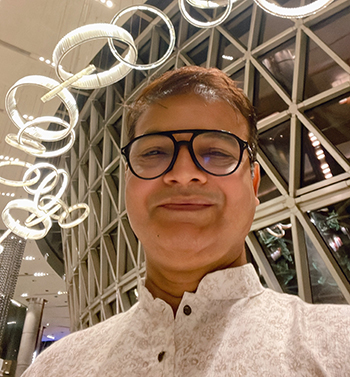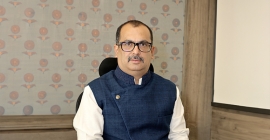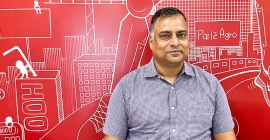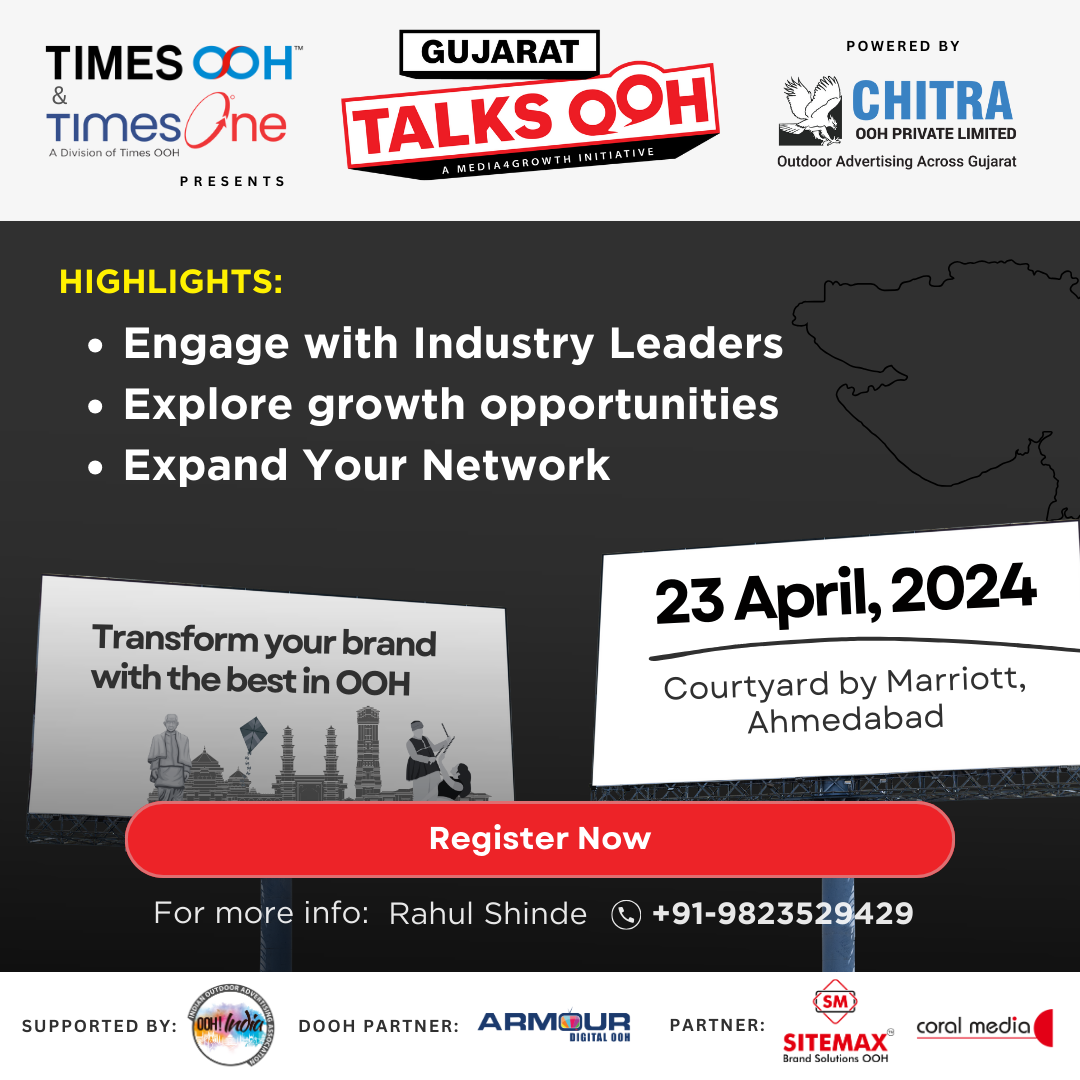‘OOH is no rocket science’
By Rajiv Raghunath - December 21, 2022
Indian OOH industry veteran Nabendu Bhattacharyya, widely known for his pioneering leadership and entrepreneurship, shares his outlook on talent acquisition & development in an interview with Rajiv Raghunath.
You have had an illustrious career and business journey in the Indian OOH domain that spans three decades. OOH is essentially a people business, and yet OOH firms have had the challenge of building organisations with the right skill sets, knowledge and industry experience. What are your thoughts on this?
I began my career working with a media owning firm. Down the years I realised that those who had entered the field with passion and dedication continued to be in the OOH industry for long years. That is quite different from some of the other industries where people tend to hop from company to company way too frequently.
 Later, in my career journey when I worked with agencies like Emirates Neon in the UAE, briefly with Mudra and then for a decade with Ogilvy in India, I also realised that the problem-solving capability of an OOH professional is way higher than many who in other advertising streams. After all, OOH people have to contend with so many challenges, of working in the outdoor space under different weather conditions, dealing with different civic authorities, and so on. Problem-solving, therefore, becomes second nature to their professional makeup.
Later, in my career journey when I worked with agencies like Emirates Neon in the UAE, briefly with Mudra and then for a decade with Ogilvy in India, I also realised that the problem-solving capability of an OOH professional is way higher than many who in other advertising streams. After all, OOH people have to contend with so many challenges, of working in the outdoor space under different weather conditions, dealing with different civic authorities, and so on. Problem-solving, therefore, becomes second nature to their professional makeup.
With regard to the professionalisation of OOH organisations, most media buys are done through agencies, except for select media owners doing direct business with clients. Had the media owners been doing direct business, they would have directed greater attention on upskilling their people or attracting the right talent.
We need to be also cognizant of the fact that those attending mass communications programmes are exposed to disciplines like PR, media, creative, digital, etc., but there is hardly any focus on OOH media in those programmes. Hence, not many among those enrolled for such programmes would look at a career in OOH.
I reckon the OOH stakeholders haven’t done enough to highlight the need for a course curriculum on OOH media, whereas OOH spends are close to Rs 5,000 crore out of a total of Rs 60,000 crore -70,000 crore ad budget.
I believe that after ad agencies set up their own OOH departments, the importance of OOH went up significantly. Yet, the agency leaders have not directed attention to bringing in management talent into this stream or training and upskilling existing talents. There isn’t enough investment into data, research or people.
Of course, at Ogilvy, there was enough effort that went into the training and development process and building skillsets for all departments of communication. That came out of the group companies’ philosophy to keep aside a certain budget for training and development out of total revenue YOY.
Having spearheaded OOH firms and ventures, what were your initiatives for developing and retaining talent at the senior, mid and junior levels while you were with different organisations?
In my past leaderships, both in Ogilvy and later in my entrepreneurial leadership role I looked at three areas for talent development and upskilling of people:
- Are they innovative thinkers? Are they ready to learn and accept challenges? I accorded high priority on these factors compared to domain knowledge and expertise.
- Skillset and passion for the industry – do they have adequate skillsets or domain knowledge and how much they had progressed over the years on radical thinking, or do they have the capacity to upskill. Hunger for progress is extremely critical along with passion, in the OOH space.
- Are they team players, ready to be part of an organisation’s culture? If the talent can’t work and bond with the team, that was a big ‘no’ for me to include them in the team.
In my entrepreneurial journey, I tried to follow these methods.
For creative talent, every Friday we organised workshops by creative directors on international case studies. As per need, the upskilling training programmes were planned for individuals.
We hired from campuses every year and put them under seniors to learn planning and buying operations and finally pitch presentations. They also brought in fresh ideas and new ways of thinking in the OOH space.
Various incentive programmes were devised to improve talent retention.
A free-flow culture in the organization and an open-door policy helped in building a happy and fun culture free from politics.
I am happy to say that in my previous organisation we had very little attrition, close to zero at the senior level. That was the primary reason for my agency’s success.
Do you see the talent requirements for the industry in India changing in the face of increasing digitalisation of the media, and use of technology for business, including adtech?
I believe more and more talent will enter this space where there are fresh opportunities and possibilities of building something new and challenging. I also believe that OOH offers those large opportunities barring some places that reached a point of saturation. At this point when DOOH slowly but surely gains momentum, we as an industry must actively reach out to business schools for fresh recruitment and the industry body as a whole should try and pitch in all forums to infuse more talents into this space. That’s how OOH will get prominence in all forums. All stakeholders should recruit fresh blood into the space and become future-ready organisations. I saw this spirit at this year’s OAC.
As a fraternity, we should be ready for digital transformation and build a culture that is modern, agile, nimble, forthcoming, trendsetting, happy and fun-loving.
Are the OOH industry roles and compensation packages attractive enough to bring talent from technology companies? What is your organisation’s experience in this regard?
I don’t have much experience in the OOH media partner space. I do know that OOH specialist agencies have par or higher than market peers /ad space compensation structures. OOH talents are paid quite well compared to other industries. In fact, the compensation level is on the high side, whereas client compensation package to agencies or spends on OOH is reducing. Also, it’s difficult to run an OOH business effectively if investment in the media doesn’t give decent ROI to the media owners. Even agencies would find it difficult to invest in research, tools, data or quality talent.
Would you recommend any pan-industry initiatives to help build a strong, large, future-proofed talent pool?
We as the OOH fraternity must take the initiative on upskilling existing talent in the organisations. We should pursue business schools to add a curriculum on OOH and the industry leaders should use their time to train students enrolled for OOH-specific courses.
The HR should thoroughly assess the talent and organise training programmes as per specific needs. Also, organisations should look to create great work that goes beyond the boundary and becomes part of the industry’s success story.

Stay on top of OOH media trends









